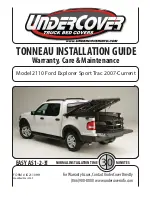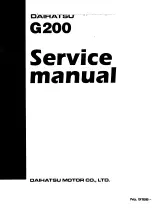
Trailer towing tips
•
Practice turning, stopping and backing up in an area before starting on
a trip to get the feel of the vehicle trailer combination. When turning,
make wider turns so the trailer wheels will clear curbs and other
obstacles.
•
Allow more distance for stopping with a trailer attached.
•
The trailer tongue weight should be 10% of the loaded trailer weight.
•
After you have traveled 80 km (50 miles), thoroughly check your
hitch, electrical connections and trailer wheel lug nuts.
•
When stopped in traffic for long periods of time in hot weather, place
the gearshift in P (Park) and increase idle speed. This aids engine
cooling and air conditioner efficiency.
•
Vehicles with trailers should not be parked on a grade. If you must
park on a grade, place wheel chocks under the trailer’s wheels.
Launching or retrieving a boat
When backing down a ramp during boat launching or retrieval,
•
Do not allow the static water level to rise above the bottom edge of
the rear bumper and
•
Do not allow waves to break higher than 15 cm (six inches) above the
bottom edge of the rear bumper.
Exceeding these limits may allow water to enter critical vehicle
components, adversely affecting driveability, emissions, reliability and
causing internal transmission damage.
Replace the rear axle lubricant anytime the axle has been submerged in
water. Rear axle lubricant quantities are not to be checked or changed
unless a leak is suspected or repair required.
Disconnect the wiring to the trailer before backing the trailer into the
water. Reconnect the wiring to the trailer after the trailer is removed
from the water.
Driving
130
Summary of Contents for 1999 Navigator
Page 146: ... Front 4x2 Front 4x4 Rear Roadside emergencies 145 ...
Page 204: ...4 1 3 5 2 Capacities and specifications 203 ...
Page 211: ...210 ...
Page 212: ...211 ...
Page 213: ...212 ...
Page 214: ...213 ...
Page 215: ...214 ...
Page 216: ...215 ...
















































